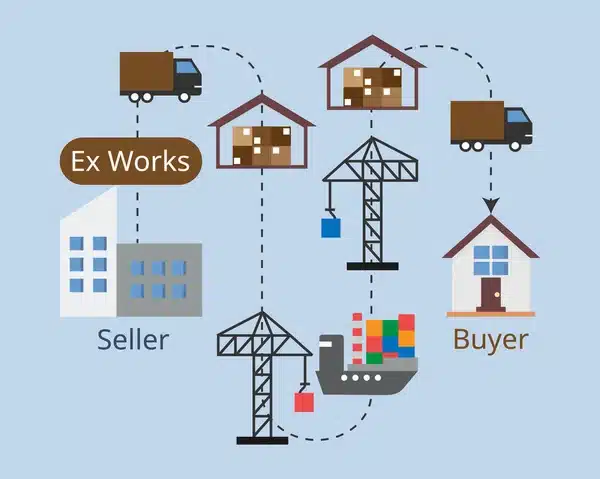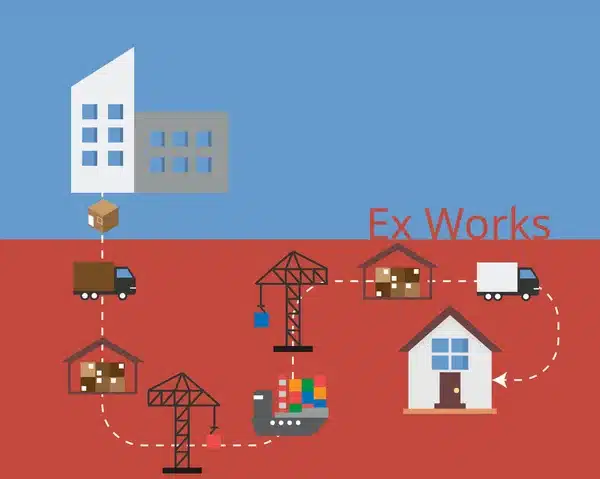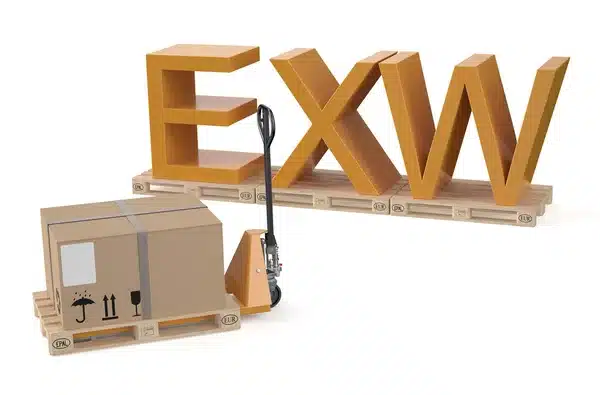EXW (Ex Works) is one of the most fundamental Incoterms in international trade, defining the seller’s and buyer’s responsibilities. Under EXW, the seller makes the goods available at their premises (factory, warehouse, or another agreed location), and the buyer assumes full responsibility for transportation, export clearance, and all associated costs and risks.
As global trade regulations evolve, the 2025 update of EXW Incoterms introduces clarifications regarding customs responsibilities, digital documentation, and risk management. This guide explores the latest updates, key responsibilities, and best practices for using EXW efficiently in global shipping.

Table of Contents
Introduction to EXW (Ex Works) Incoterms 2025
EXW (Ex Works) is one of the most widely used Incoterms 2025, outlining the responsibilities of buyers and sellers in global trade. Under EXW, the seller’s obligation is minimal, as they only need to make the goods available at their premises or another agreed location (such as a warehouse or factory). The buyer assumes full responsibility for transportation, customs clearance, and all associated costs and risks from the seller’s premises to the final destination.
Key Aspects of EXW:
- The seller delivers goods at their facility with minimal obligations.
- The buyer arranges pickup, export/import clearance, and international transport.
- All risks transfer to the buyer once goods are made available for collection.
This shipping term is often chosen by experienced importers who can efficiently handle logistics, customs, and freight forwarding on their own. However, understanding its advantages and potential challenges is essential before selecting EXW as a trade term.

Key Responsibilities in EXW 2025
EXW (Ex Works) places minimum responsibility on the seller while the buyer assumes all costs and risks associated with transportation, customs clearance, and delivery to the final destination. Understanding the key responsibilities for both parties is essential when using this Incoterm.
Seller’s Responsibilities
- Make the goods available at their factory, warehouse, or agreed location.
- Provide essential commercial documents, such as:
- Commercial Invoice
- Packing List
- Proforma Invoice (if applicable)
- Ensure goods are properly packed and ready for collection.
- Assist in export clearance procedures if required by local regulations (though it is not an obligation).
Buyer’s Responsibilities
- Arrange pickup, transport, and loading from the seller’s premises.
- Handle export customs clearance, if required in the country of origin.
- Cover all costs and risks once goods leave the seller’s premises, including:
- International shipping and freight charges.
- Import customs duties, VAT/GST, and clearance fees.
- Local transportation to the final destination.
- Ensure the correct import documentation is prepared for a smooth customs process.
Since the buyer is responsible for nearly all logistics, EXW is typically best suited for experienced importers who have established freight forwarding and customs processes.
What’s New in EXW Incoterms 2025?
The 2025 revision of Incoterms includes updates to EXW (Ex Works) to reflect modern trade practices, digitalization, and regulatory changes. While the fundamental structure remains the same, the following updates clarify documentation, export procedures, and risk management:
Clarifications on Digital Documentation
- Acceptance of digital documents such as e-invoices, e-bills of lading, and electronic customs clearance forms is now explicitly recognized.
- Buyers and sellers can agree to use electronic formats for customs clearance and trade compliance.
- Greater harmonization with global trade platforms, reducing paperwork and delays.
Updates on Export Customs Responsibilities
- While EXW typically requires the buyer to handle export clearance, the 2025 revision clarifies that sellers must provide reasonable assistance if local regulations require their involvement.
- Some countries do not allow foreign buyers to process export customs, in which case the seller may need to complete export formalities on behalf of the buyer.
Revised Guidelines for Insurance and Risk Transfer
- Insurance remains optional in EXW, but new recommendations suggest that buyers and sellers agree on risk mitigation strategies.
- The risk transfer remains at the seller’s premises, but additional guidance on how to handle force majeure events (e.g., political disruptions, transport strikes) is included.
- In cases where the buyer arranges transport, it is recommended to obtain clear documentation proving when the goods were collected to avoid disputes over damage or loss.
These EXW 2025 updates enhance clarity and adaptability in global trade, helping businesses streamline international transactions while addressing modern logistics and compliance challenges.
Advantages and Disadvantages of EXW
EXW (Ex Works) is a seller-friendly Incoterm that shifts most shipping responsibilities to the buyer. While it provides flexibility, it also presents challenges, particularly for inexperienced buyers handling international logistics.
Advantages for Sellers
✔ Minimal Responsibility – The seller only needs to make the goods available at their premises, avoiding shipping and customs complexities.
✔ No Transport or Customs Hassle – No obligation to arrange freight, insurance, or customs clearance.
✔ Cost Savings – Sellers do not have to include shipping and export costs in their pricing, making their goods more competitive.
✔ Better Control Over Local Operations – Sellers focus solely on manufacturing and domestic logistics without dealing with international trade requirements.
Disadvantages for Buyers
✘ Full Responsibility for Shipping & Customs – Buyers must arrange transport, export clearance, import duties, and final delivery.
✘ Potential Higher Costs – If unfamiliar with international freight, buyers may face higher shipping rates, customs fees, or unexpected expenses.
✘ Risk of Transport Issues – Since risk transfers at the seller’s premises, buyers bear responsibility for damages or delays once the goods leave the warehouse.
✘ Complex Logistics Coordination – Buyers must coordinate multiple service providers, including freight forwarders, customs brokers, and local transport companies.
EXW benefits sellers by limiting obligations but places a heavy burden on buyers, making it best suited for experienced importers with established logistics networks.
EXW vs. Other Incoterms (FCA, FOB, DDP)
Each Incoterm defines different levels of responsibility between the buyer and seller. Here’s how EXW compares with other common Incoterms:
| Incoterm | Seller’s Responsibility | Buyer’s Responsibility | Best Use Case |
|---|---|---|---|
| EXW (Ex Works) | Only makes goods available at the factory | Buyer handles all transport and customs | Best for experienced importers managing logistics independently |
| FCA (Free Carrier) | Delivers goods to the carrier nominated by the buyer | Buyer manages international transport | More flexible than EXW, suitable for multimodal transport |
| FOB (Free on Board) | Loads goods onto the vessel at the port of departure | Buyer handles ocean freight, import customs, and inland transport | Ideal for sea shipments where the buyer prefers control over freight costs |
| DDP (Delivered Duty Paid) | Handles all shipping, import duties, and customs clearance | Receives goods at their door | Best for hassle-free, door-to-door shipping with all costs covered |
Key Takeaways
- EXW is the most buyer-responsible Incoterm, offering sellers the least obligation.
- FCA provides a middle-ground where the seller delivers goods to a specific location.
- FOB is preferred for sea shipments where the seller is responsible for loading onto the vessel.
- DDP shifts all responsibility to the seller, ensuring the buyer receives goods with no customs or shipping concerns.
Understanding these differences helps importers and exporters choose the most cost-effective and risk-appropriate Incoterm for their trade transactions.
How to Handle EXW Shipping Efficiently?
Since EXW (Ex Works) places most of the responsibility on the buyer, ensuring a smooth shipping process requires proper planning and coordination. Follow these key strategies to handle EXW shipments efficiently:
Work with a Reliable Freight Forwarder
- Partnering with an experienced freight forwarder like Tonlexing ensures smooth logistics management.
- A forwarder can handle pickup, export documentation, customs clearance, and international transport, reducing the buyer’s burden.
- Freight forwarders negotiate better rates for sea, air, or rail freight and manage cargo consolidation for cost savings.
Understand Customs Regulations
- Export Customs Clearance: In some countries (e.g., China), the exporter must handle customs declarations, even under EXW terms.
- Import Duties & Taxes: Buyers should check import regulations in their country to avoid unexpected costs or shipment delays.
- Some governments restrict certain goods under EXW, requiring the seller’s involvement in export clearance.
Insure Your Shipment
- Since the buyer assumes risk once goods leave the seller’s premises, cargo insurance is highly recommended.
- Insurance covers damage, theft, or loss during transit, ensuring financial protection.
- Buyers should opt for comprehensive insurance coverage for high-value shipments.
Plan for Transportation and Delivery
- Choose the most cost-effective and time-efficient shipping method:
- Sea Freight for bulk cargo (FCL or LCL).
- Air Freight for urgent deliveries.
- Rail Freight for a balance between speed and cost.
- Factor in port congestion, customs processing times, and potential delays when planning shipments.
Optimize Freight Costs
- Consolidate shipments if possible to reduce LCL (Less than Container Load) shipping costs.
- Avoid peak seasons to minimize high freight rates and port congestion delays.
- Compare quotes from multiple carriers to secure competitive rates.
By working with professional logistics providers, understanding customs procedures, and securing cargo insurance, importers can efficiently manage EXW shipping while minimizing risks and costs.

Why Choose Tonlexing for EXW Shipping?
Choosing the right logistics partner is crucial for successfully handling EXW shipments. Tonlexing offers end-to-end logistics solutions to simplify the shipping process, ensuring efficiency, cost savings, and compliance with global trade regulations.
1. Comprehensive Freight Services
- Sea Freight (FCL & LCL): Cost-effective solutions for bulk shipments.
- Air Freight: Fast and reliable shipping for urgent or high-value goods.
- Rail Freight: Ideal for shipping to Europe with shorter transit times than sea freight.
- Door-to-Door (DDP) Shipping: Hassle-free delivery with all customs duties and taxes included.
2. Customs Expertise
- Expert handling of customs clearance for major markets, including the USA, EU, UAE, Saudi Arabia, Russia, and more.
- Assistance with HS code classification, import duty calculation, and export documentation.
- Specialized support for restricted or high-value products to ensure smooth clearance.
3. Transparent Pricing & Cost Optimization
- No hidden costs—detailed breakdowns of freight, customs, and handling charges.
- Optimized shipping routes to minimize costs and transit times.
- Flexible solutions for different shipping needs, from small parcels to full container loads.
4. End-to-End Logistics Support
- Cargo insurance options to protect against loss or damage.
- Real-time shipment tracking for complete visibility throughout the process.
- Dedicated customer support to handle any logistics challenges efficiently.
For a seamless EXW shipping experience, contact Tonlexing today and let our team handle your international freight needs with professionalism and expertise!

